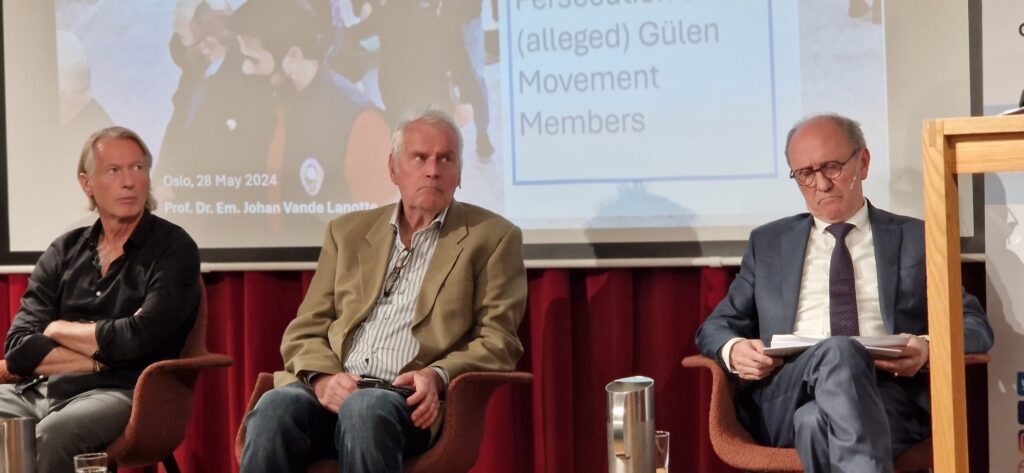Bünyamin Tekin
Panelists at an event organized by a rights group in Oslo on Tuesday criticized Norway’s approach to asylum applications from Turkish nationals, particularly those affiliated with the Gülen movement, a faith-based group outlawed by Ankara, and stressed that the Turkish government’s crackdown on the group has not abated.
The event, which aimed to shed light on human rights violations in Turkey, featured detailed accounts of ongoing persecution and called for more thorough assessments of asylum applications by Norwegian authorities.
Turkey accuses the Gülen movement, a faith-based group invested in education and relief work throughout the world and inspired by Muslim cleric Fethullah Gülen, of masterminding a failed coup in July 2016. The movement strongly denies any involvement in it.
Following the failed coup, the Justice and Development Party (AKP) government launched a massive purge targeting real and alleged members of the movement under the pretext of an anti-coup fight, removing over 130,000 people from civil service jobs.
The AKP had designated the group as a terrorist organization before the coup and jailed tens of thousands on alleged membership in the movement, seizing schools, universities, media outlets, companies and their buildings and the assets of individuals, corporations and organizations that were believed to have had ties to the organization.
Selcuk Gültaşlı, former Brussels bureau chief of the now-closed Zaman daily, opened the panel by discussing the relentless oppression of Gülen movement members in Turkey following the coup attempt in July 2016.
The Zaman daily, which was Turkey’s best-selling newspaper, was closed down by the Turkish government following the abortive putsch due to its alleged links to the movement.
Gültaşlı emphasized that the Turkish government continues to target members of the movement across all walks of life despite claims by some European governments that persecution has decreased and that they are basing their reasons for rejecting asylum applications from Gülen members on this.
Prof. Em. Dr. Johan Vande Lanotte, a former deputy prime minister of Belgium and reputed professor in international human rights law who has extensively studied the Turkish judicial system, argued that the foundations of the persecution have not changed.
He pointed to the Yalçınkaya case, where the European Court of Human Rights identified significant legal shortcomings in Turkey’s terrorism convictions. Vande Lanotte highlighted that despite some judicial reforms, the Turkish government’s stance towards the Gülen movement remains aggressively unchanged, with thousands still facing prosecution.
Teacher Yüksel Yalçınkaya was sentenced in 2017 to more than six years in prison over his alleged links to the Gülen movement.
His conviction was based on his bank account, labor union membership and use of a mobile messaging application called ByLock.
Turkish officials expressed their intent to implement the Yalçınkaya ruling as an isolated case instead of interpreting it as a precedent.
Experts such as the Turkish Bar Association and prominent jurist Tolga Şirin have called on the Turkish government to abide by the Yalçınkaya judgment.
In the meantime, reports indicated ongoing waves of detention of people over ByLock use despite the Yalçınkaya ruling.
Following the coup attempt in 2016, the Turkish government summarily removed some 4,000 judges and prosecutors from their jobs due to alleged Gülen links.
Many experts and observers said the post-coup purges had a chilling effect on the remaining members of the judiciary.
Turkish President Recep Tayyip Erdoğan’s government has also been accused of replacing the purged judicial members with young and inexperienced judges and prosecutors who have close links to the ruling AKP.
In a development that confirmed the erosion of the Turkish judiciary, Turkey was ranked 117th among 142 countries in the 2023 Rule of Law Index published by the World Justice Project (WJP) in late October, dropping one place in comparison to the previous year.
Ragnar Nes, a Norwegian philosopher and human rights activist, provided personal anecdotes to illustrate the severity of the situation. He described his experiences with Turkish communities and the intense polarization that persists.
Jørgen Lorentzen, a Norwegian literary scholar, questioned the integrity of a recent country information report by Norwegian authorities, which has been used to deny asylum claims. He criticized the superficial nature of the report, noting that it undermines the gravity of the ongoing human rights abuses in Turkey. Lorentzen called for immediate action to address the discrepancies in the asylum process, stressing the need for a thorough, evidence-based approach.
Ola Elvestuen, a member of the Norwegian parliament, acknowledged the criticism and expressed concern over the potential misjudgments in asylum decisions. He emphasized that individual cases of persecution should not be overlooked due to broader political dynamics and affirmed the importance of upholding Norway’s reputation as a champion of human rights.
The panel also featured emotional testimony from Turkish asylum seekers, including Müberra Bilgebal, who shared her family’s plight following her father’s imprisonment for his affiliation with the Gülen movement. Her account underscored the ongoing risks faced by returnees to Turkey, challenging the notion that the situation has improved.
In closing, the panelists urged Norwegian authorities to re-evaluate their “country information” and ensure that decisions regarding asylum seekers are based on comprehensive and accurate reports. They called for continued international pressure on Turkey to address its human rights record and to support those fleeing persecution.
President Erdoğan has been targeting followers of the Gülen movement, inspired by Turkish Muslim cleric Fethullah Gülen, since the corruption investigations of December 17-25, 2013, which implicated then-prime minister Erdoğan, his family members and his inner circle.
Dismissing the investigations as a Gülenist coup and conspiracy against his government, Erdoğan designated the movement as a terrorist organization and began to target its members. He intensified the crackdown on the movement following the abortive putsch in 2016 that he accused Gülen of masterminding. Gülen and the movement strongly deny involvement in the coup attempt or any terrorist activity.
In addition to the thousands who were jailed, scores of other Gülen movement followers had to flee Turkey to avoid the government crackdown.


